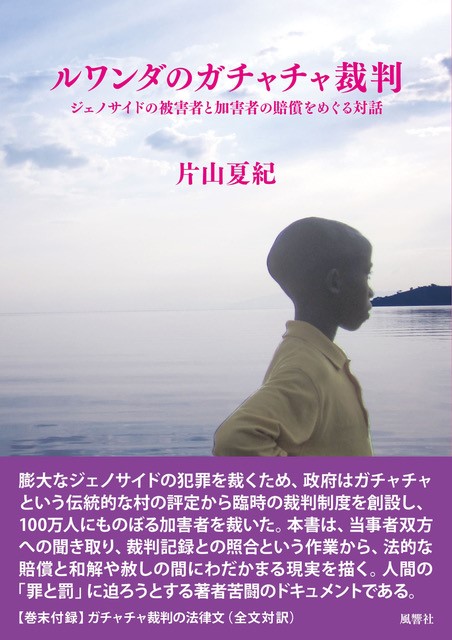
Title
Rwanda no Gacaca Saiban (Dialogue for Compensations of genocide crimes between victims and perpetrators)
Size
436 pages, A5 format
Language
Japanese
Released
March 31, 2025
ISBN
9784894890466
Published by
Fukyosha
Book Info
See Book Availability at Library
Japanese Page
‘Do you know about the Rwandan genocide in 1994?’
When I ask students this in my university class, one-third answer ‘yes.’ However, this incident is only briefly mentioned in high school world history classes and is not taught in detail. I wrote my book to tell the generation born after the Rwandan genocide about it.
Genocide is the act of exterminating a specific ethnic group, race, or believers of a specific religion. In Rwanda, the Hutus, the majority ethnic group, massacred more than 500,000 Tutsi, a minority ethnic group, in 100 days. The reason for the high number of victims was that many Hutu citizens joined in the massacre of the Tutsi as well, following the orders of politicians and soldiers.
After the Rwandan genocide, the government set up temporary courts in approximately 12,000 locations nationwide and judged that 1 million Hutu citizens committed crimes. These courts were named‘Gacaca Courts’(Inkiko Gacaca in Kinyarwanda).
I want to emphasize that citizens aged 18 and over were required to participate in Gacaca Courts. Citizens gathered a huge amount of information and identified the perpetrators. The judges were citizens aged 21 years and over who met certain criteria, such as being highly moral and honest. They imposed prison terms and community services (such as building houses and roads) for murder and assault and ordered compensation for theft and property damage.
The Gacaca Courts operated from 2001 to 2012, but the perpetrators continue to pay compensation to the victims. Compensation causes the perpetrators to become poor, and the lack of it causes victims to become poor as well. Thus, compensation can cause serious social problems. Even in such circumstances, there are cases where victims and perpetrators’ dialogue solves the problem and restores their relationship. My research aims to reveal the reality of a post-genocidal society.
Many victims and perpetrators lived in the same village before the genocide began. I started fieldwork in 2009, living in multiple villages, sharing daily lives with residents to build relationships, and conducting interviews with 97 individuals—primarily victims and perpetrators. In my book, I wrote about the complex emotions of victims who cannot forgive even if they want to, as well as the perpetrators' guilt, which cannot simply lead to ’reconciliation.’
Citizens who were judged in the Gacaca Courts recorded the proceedings in detail. Court records are stored at the police headquarters in the capital city of Kigali and cannot be accessed without special permission. I negotiated with the government for permission to access them. By reading them, I was able to understand how genocide occurred, and how the Gacaca Courts operated in each field. I was thus able to present information in my book that could not be known only from the narratives of victims and perpetrators.
The originality of this book lies in two appendices. The first is the format of the indictment, which was designed to be judged quickly. This manuscript has been published with permission from the government. The second is the full text of the law of the Gacaca Court. The original text was written in Kinyarwanda and English, so I translated the entire text into Japanese.
As stated by Rwandans I interviewed, ‘The genocide is not over’; it still has an impact on current society. Even now, there are many wars and conflicts worldwide, such as in Ukraine, Palestine, and Sudan, which will continue to impact citizens long after they are over. It is important to understand the situation with this in mind.
(Written by: KATAYAMA Natsuki / September 22, 2025)
Related Info
The 5th UTokyo Jiritsu Award for Early Career Academics (The University of Tokyo 2024)
https://www.u-tokyo.ac.jp/ja/research/systems-data/n03_kankojosei.html
Essay:
Natsuki Katayama. Reconciliation and Violence. (Exploring International Reconciliation Studies. Newsletters and Essays. July 2024)
https://memory.w.waseda.jp/newsletter_en/520



